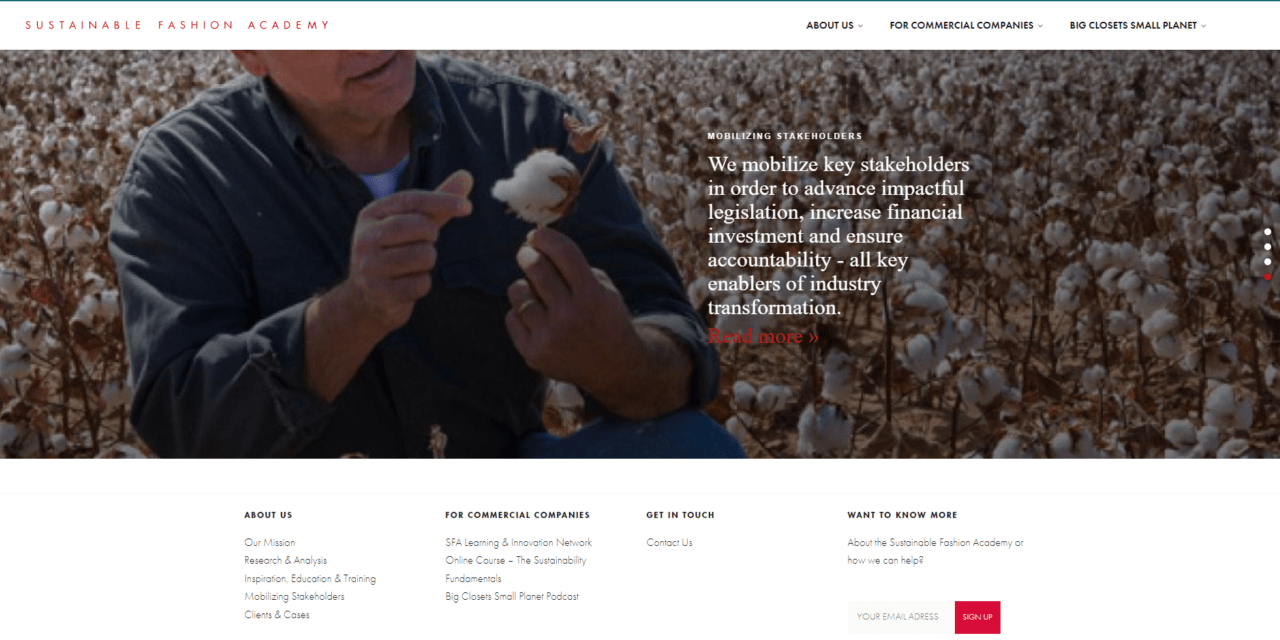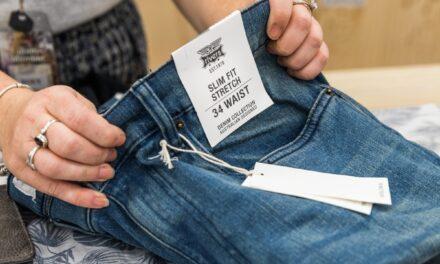In the article we highlight some of the key details about the Sustainable Fashion Academy and its programs. Gain expertise in sustainable fashion design, business, and more. Start your eco-friendly journey today!
Sustainable fashion is a growing movement that seeks to reduce the environmental and social impact of clothing production. It encompasses practices such as using eco-friendly fabrics, reducing waste during manufacturing, and ensuring fair labor practices for workers in the fashion industry.
As consumers become more conscious about their impact on the planet, sustainable fashion has gained traction as a way to address these concerns. In this context, the Sustainable Fashion Academy has emerged as a leading institution that offers education and training for aspiring professionals who want to make a positive difference in the world.
Definition of Sustainable Fashion
Sustainable fashion is an approach to clothing production that takes into account its environmental and social impact. It aims to create clothing that is durable, eco-friendly, and socially responsible.
This involves using materials that are renewable or recycled, reducing waste during manufacturing, and implementing fair labor practices throughout the supply chain. Sustainable fashion also seeks to involve consumers in this process by educating them about these issues and encouraging them to make more informed choices when purchasing clothing.
Importance of Sustainable Fashion in Today’s World
The fashion industry is one of the most polluting industries in the world. Textile production requires large amounts of water, energy and chemicals which can cause significant damage to local ecosystems if not managed responsibly.
Additionally, garment factories often have poor working conditions for employees which can lead to exploitation and human rights violations. By embracing sustainable fashion practices such as using organic cotton or recycled fabrics we can reduce our carbon footprint while also ensuring ethical production standards.
Furthermore, consumer demand for transparency around ethical issues related to companies’ supply chains has grown significantly over recent years with many people requiring more information regarding where their clothes come from before making purchases. Thus there is a need for business models centered on sustainability and transparency.
Overview of the Sustainable Fashion Academy
The Sustainable Fashion Academy is a leading institution that offers education and training for professionals seeking to make a positive impact on the fashion industry. Established in 2014, it is based in Copenhagen, Denmark, and has quickly become recognized as one of the most prestigious institutions for sustainable fashion education worldwide.
The academy offers both undergraduate and graduate programs, as well as short-term courses for professionals looking to gain specific skills or knowledge. With its focus on sustainability and ethical practices throughout the supply chain, it has been instrumental in driving the shift towards more responsible fashion production.
What is the Sustainable Fashion Academy?
History and Background
The Sustainable Fashion Academy (SFA) was founded in 2010 in Stockholm, Sweden. The academy was established in response to the growing concerns about the detrimental impact of fast fashion on the environment and society. The founders wanted to create an institution that would promote sustainable practices and educate future generations of designers and entrepreneurs on how to be part of a more responsible fashion industry.
Over the years, SFA has gained recognition as a leading institution for sustainable education in fashion. The academy has expanded its programs to accommodate students from all over the world who share an interest in sustainable fashion.
Mission and Values
The mission of SFA is to “educate, inspire and empower students to create a sustainable future for fashion.” The academy is committed to promoting sustainability throughout the entire value chain of the fashion industry, from design to production, marketing, consumption, and disposal. The values that guide SFA are transparency, innovation, creativity, collaboration, responsibility, and ethics.
Programs and Courses Offered
SFA offers a variety of programs that cater to different interests in sustainable fashion education. One of their most notable programs is the Bachelor’s degree program in Sustainable Fashion Design which focuses on teaching students how to design environmentally conscious clothing while also addressing social issues related to labor rights.
SFA also offers Master’s degree programs such as Sustainable Fashion Business which combines business strategies with environmental awareness or Textile Recycling which focuses on upcycling used textiles into new high-quality products. Additionally, they offer short-term courses focused topics such as circular economy or textile dyeing techniques.
The Synergy Between History And Innovation
There seems like there has always been a trade-off between history/culture/trends ,and progress/innovation/sustainability but what if these two elements could complement each other? SFA has shown that, with the right education and practices, the fashion industry can preserve its cultural heritage while still innovating towards a more sustainable future.
By being grounded in history and culture, fashion designers have been able to create innovation as they find new ways to create eco-conscious clothing that reflects their roots. The sustainable fashion courses at SFA encourage students to think outside of the box and experiment with materials and techniques while keeping in mind an ethical approach that makes sustainability a priority.
Creating A More Responsible Fashion Industry
SFA’s programs are designed to create a more responsible fashion industry by promoting transparency, creativity, and innovation. The academy teaches students how to be mindful of their impact on the environment throughout every stage of production; from sourcing materials ethically to designing clothes for longevity rather than just for trends or seasons.
By focusing on ethical practices such as fair labor policies and transparent supply chains SFA aims to eliminate the exploitation of workers in developing countries often associated with fast fashion brands. Through its courses on textile recycling, students learn how waste can be given second life by repurposing it into new high-end products.
The Importance Of Accreditation And Recognition
Choosing an accredited institution is crucial when considering higher education because it ensures that your degree will be recognized nationally or internationally. SFA is accredited by both Swedish Higher Education Authority (UKÄ) and International Accreditation Council for Business Education (IACBE). This means that graduates from SFA can be confident that their degree is of high quality and will help them stand out when applying for jobs in their respective fields.
Furthermore, SFA has won several awards recognizing its excellence in sustainable education such as “Best Masters Programme” award by Eduniversal ranking agency. These accolades serve as evidence of the academy’s commitment to promoting sustainability in education while also encouraging innovation skills amongst its students.
Why Choose the Sustainable Fashion Academy?
The fashion industry is developing rapidly, and sustainability has become a significant issue in the industry. Consumers are now more aware of the impact of fast fashion on the environment and are willing to pay for sustainable clothing.
The Sustainable Fashion Academy (SFA) offers education programs that focus on sustainability and ethical practices in the fashion industry. Here are some reasons why SFA is an excellent choice for students who want to study sustainable fashion:
Expert faculty members
At SFA, students will learn from experienced faculty members who have expertise in sustainable fashion design, business, production, and marketing. The faculty members have extensive knowledge about textiles, fabrics, recycling practices, circular economy concepts and they teach courses that integrate these topics into the curriculum. They challenge students to think critically about issues like environmental impact, ethical labor practices and social justice within the fashion industry.
The faculty members also believe in providing personalized attention to each student’s needs by fostering a supportive learning environment where every student’s perspective is valued. They provide mentorship opportunities for students by sharing their experiences and guiding them through various challenges they face during their studies.
Hands-on learning experiences
At SFA, hands-on learning experiences play a crucial role in teaching sustainable fashion practices. The academy provides practical training sessions where students get to work with recycled materials or design clothing using eco-friendly fabrics like organic cotton or bamboo fiber.
Additionally, SFA offers internships with leading sustainable brands so that students can apply their knowledge in real-world settings. These internships give them an opportunity to learn from professionals working in various fields of sustainable fashion while enhancing their skills for future employment opportunities.
Focus on sustainability and ethical practices
Sustainability is at the core of everything taught at SFA. Students learn about innovative ways to reduce waste while producing high-quality products using eco-friendly materials.
They analyze the environmental impact of their design choices, and they learn about the principles of sustainable fashion production like waste reduction, upcycling practices, and ethical labor standards. As a result, SFA graduates are equipped with comprehensive knowledge of sustainable fashion practices and can help create a more sustainable future for the industry.
Choosing SFA as an educational institution means students can gain a competitive edge in the job market by demonstrating their ability to apply ethical and sustainable practices while still being creative in their work. Sustainability is not just a concept but is becoming increasingly important in every aspect of our lives.
The fashion industry needs to adapt to reflect this change in consumer demand for transparent and eco-friendly clothing production. The Sustainable Fashion Academy at provides students with the tools they need to become agents of change within the fashion industry by choosing to study at SFA; students have an opportunity not just to build careers but also make important contributions towards building a more sustainable world.
Programs and Courses Offered at the Sustainable Fashion Academy
Bachelor’s degree in sustainable fashion design
The Bachelor’s degree in Sustainable Fashion Design is a four-year program that prepares students for careers in designing sustainable fashion. The curriculum includes core courses in fashion design, pattern making, textile science, and sustainability. Students also take specialized courses such as eco-friendly dyeing and printing techniques, circular design principles, and sustainable supply chain management.
The program emphasizes hands-on learning experiences through practical projects and internships with leading sustainable fashion companies. Students get to work with natural materials like organic cotton, bamboo, hemp, and recycled fabrics while learning how to minimize waste and reduce the environmental impact of their designs.
Graduates from this program are equipped with a unique skill set that combines creative design thinking with sustainable practices. They can pursue careers as designers, product developers, technical designers, or entrepreneurs in the sustainable fashion industry.
Master’s degree in sustainable fashion business
The Master’s degree in Sustainable Fashion Business is another popular program offered by the Sustainable Fashion Academy. This two-year course provides students with an understanding of the business side of the fashion industry while emphasizing sustainability.
Students learn about topics such as supply chain management, marketing strategies for eco-friendly products, ethical production practices, and circular economy principles. The program also includes case studies on successful sustainable fashion businesses around the world.
Students are required to complete a thesis project on a real-world issue related to sustainability or social responsibility in the fashion industry. Graduates from this program can pursue careers as sustainability consultants for brands or start their own eco-fashion businesses.
Short-term courses on specific topics like textile recycling, circular economy
Apart from undergraduate and graduate programs mentioned above ,the academy offers several short-term courses catering to specific interests like textile recycling,circular economy,and many more.The length of these courses can vary from few weeks to a few months and are particularly useful for individuals who want to learn about sustainability in fashion but aren’t necessarily pursuing a degree. Courses like “Textile Recycling for Sustainable Fashion” teach students about innovative techniques to recycle textile waste and design new products from it. Similarly, the course on “Circular Economy in Fashion” focuses on how businesses can create closed-loop systems that eliminate waste and minimize environmental impact.
These courses provide students with valuable knowledge and skills to make their own contribution towards sustainable fashion. They’re ideal for working professionals who want to add sustainable practices to their work or anyone else interested in learning about eco-friendly fashion practices.
Campus Life at the Sustainable Fashion Academy
Facilities available for students
The Sustainable Fashion Academy provides its students with state-of-the-art facilities that are designed to create a conducive learning environment. The academy’s campus is equipped with modern classrooms, labs, and workshops that are equipped with the latest technology.
The academy’s facility also houses a vast library, which is stocked with an extensive collection of books, journals, and research papers on sustainable fashion. Moreover, the academy has an extensive network of resources that students can use to gain hands-on experience in the industry.
Students have access to fully equipped studios where they can experiment with new designs and textiles. There are also special areas dedicated to textile production and recycling where students can learn about sustainable practices in real-world settings.
In addition, the Sustainable Fashion Academy provides its students with opportunities for internships and externships that allow them to gain practical experience in various aspects of sustainable fashion. Through these programs, students learn how to apply their theoretical knowledge in practical settings which is essential for their professional development.
Collaboration with industry partners
The Sustainable Fashion Academy collaborates with leading fashion brands and retailers who share its commitment to sustainability. These partnerships provide students with exciting opportunities such as attending workshops hosted by industry leaders or participating in live projects where they work on real-world sustainability challenges faced by companies. The academy also provides various platforms for interaction between students and industry experts through guest lectures from leading professionals in the field of sustainable fashion.
These interactions offer valuable insights into current trends and practices which prepare graduates for successful careers in sustainable fashion. Moreover, collaborations between the academy and industry partners provide graduates with direct access to career opportunities after graduation as companies often recruit from within their student body.
Student clubs and organizations
The Sustainable Fashion Academy encourages student participation through various social clubs and organizations on campus. These clubs provide opportunities for students to collaborate with peers who share their interests and work towards common goals. Examples of student clubs include the Fashion Sustainability Club, the Textile Recycling Club, and the Sustainable Business Association.
These organizations provide students with avenues to explore their passions and sharpen their skills through various activities such as organizing fashion shows, participating in outreach programs, or developing new research projects. Participation in these groups can also enhance a student’s resume and provide valuable networking opportunities.
Overall, campus life at the Sustainable Fashion Academy is designed to create an immersive experience that fosters creativity, collaboration, and innovation. The academy’s commitment to sustainability is reflected in all aspects of its operations which prepares graduates for lifelong careers that address critical global challenges.
Career Opportunities After Graduation from the Sustainable Fashion Academy
Job prospects in various fields like design, production, marketing, etc.
Graduates from the Sustainable Fashion Academy have a wide range of career opportunities available to them. With a focus on sustainability and ethical practices, graduates are equipped with the knowledge and skills to make a positive impact in the fashion industry.
Some of the most common career opportunities for graduates include positions in sustainable fashion design, production, marketing, retail management, textile manufacturing and recycling. Sustainable fashion designers create clothing and accessories using eco-friendly materials while adhering to ethical labor practices.
Production managers oversee all aspects of clothing manufacturing from sourcing materials to ensuring efficient production processes. Marketing professionals use their expertise to promote sustainable brands through social media and other marketing channels.
Retail managers ensure that products are displayed ethically in stores and manage sustainable supply chains. Textile manufacturers work towards producing environmentally friendly fabrics while recycling professionals turn waste into new textiles.
Success stories of alumni from the academy
The Sustainable Fashion Academy has produced numerous successful alumni who have made significant contributions to the fashion industry. One such success story is Maria Grachvogel who graduated from the academy with a degree in sustainable fashion design. She is now a renowned designer known for her innovative approach towards sustainability in fashion.
Another success story is Kate Dwyer who graduated with a degree in sustainable fashion business. She now manages her own sustainable label called “Glow Organic” which specializes in organic cotton clothing for women.
The academy’s emphasis on hands-on learning experiences combined with expert faculty members has helped many graduates achieve their career goals. Today they work for various brands like Patagonia, Stella McCartney and Everlane among others.
A Global Impact
Graduates from The Sustainable Fashion Academy not only contribute to their local communities but also make an impact globally. By advocating for sustainable and ethical practices, they help shape the future of the fashion industry. The academy’s commitment to sustainability has created a network of graduates who work together to promote environmentally responsible practices in the fashion world.
Whether it’s working towards reducing waste or creating eco-friendly materials, graduates from The Sustainable Fashion Academy are making a difference through their careers. They are driving change and creating a more sustainable future for generations to come.
The Future of Sustainable Fashion
The demand for sustainable fashion is growing rapidly, and as such, there is an increasing need for professionals who understand the importance of ethical practices in fashion. The Sustainable Fashion Academy is well-positioned to prepare students for this growing field by providing them with a comprehensive understanding of sustainability in fashion.
Graduates from the academy are poised to lead the change towards a more sustainable fashion industry in the years to come. As consumers become more aware of their impact on the environment, they will continue to seek out brands that prioritize sustainability and ethical labor practices.
Therefore, it is imperative that fashion businesses adapt their practices accordingly. Graduates from The Sustainable Fashion Academy will be at the forefront of this movement, leading innovation and driving positive change within the industry.
Conclusion
After exploring the Sustainable Fashion Academy, it is clear that this institution is a great choice for anyone interested in pursuing a career in sustainable fashion. With its expert faculty members, hands-on learning experiences, and focus on sustainability and ethical practices, students will be well-equipped to make a positive impact in the fashion industry. The programs and courses offered at the Sustainable Fashion Academy cater to various interests and skill sets.
From the Bachelor’s degree in sustainable fashion design to the Master’s degree in sustainable fashion business, there is something for everyone. The short-term courses on specific topics like textile recycling and circular economy are also valuable options for those who want to specialize in a certain area.
Campus life at the Sustainable Fashion Academy offers unique opportunities for students. The facilities available are top-notch, with cutting-edge technology and equipment that enable students to experiment with different techniques and materials.
Collaboration with industry partners ensures that students have access to real-world experience through internships or industry projects. Student clubs and organizations provide an opportunity for like-minded individuals to come together and work towards common goals.
Choosing a sustainable fashion education at an institution like the Sustainable Fashion Academy is more important now than ever before. With climate change posing significant risks to our planet, it is crucial that we shift our focus towards sustainable practices not only in fashion but across all industries.
By choosing an education focused on sustainability and ethical practices, graduates will be able to make meaningful contributions towards creating a better future for all. If you are passionate about creating positive change in the world of fashion while still making beautiful garments then choosing the Sustainable Fashion Academy can help you achieve your goals while ensuring you do your part towards building a more just future through responsible consumption of resources.










